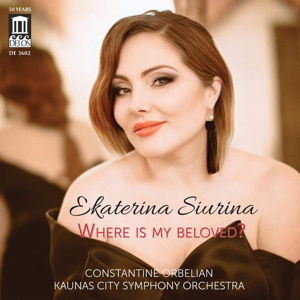
Ekaterina Siurina (soprano)
Where Is My Beloved?
Kaunas City Symphony Orchestra/Constantine Orbelian
rec. 2022, Kaunas Philharmonic, Lithuania
Sung texts with English translations enclosed
Delos DE3602 [53]
My colleague Göran Forsling reviewed this recently, giving it a strong recommendation, and I refer you to his review for some background information and an opinion different from mine. I was not familiar with this singer before listening to this disc; my first impressions from the famous “Song to the Moon” from Dvořák’s Rusalka were of a strong, steady voice of no special personality or distinction compared with exponents such as Lucia Popp, Frederica von Stade or Renée Fleming; I also found Orbelian’s accompaniment there to be rather limp.
Moving on to the Manon Lescaut and Suor Angelica arias, Siurina’s middle voice is tonally a little thin and I hear no evidence of lower register development; its strength seems to be loud, rather strident top notes which pulse somewhat and the sinews of her Italian could be more prominent, as her diction is a little mushy. Again, I find Orbelian’s manner rather slow and lacking in tension, matching Siurina’s stately manner. I do not feel that she is completely engaged with the plight of either Manon or Angelica but is rather more concerned with producing a stream of beautiful sound. The effect on me is one of imperturbable placidity and one rendering succeeds another with no difference in affect or characterisation. I keep thinking what Callas would tell her about a) inhabiting the character b) inflecting the text c) deploying lower register. As far as I am concerned, in “Un bel dì”, Cio-Cio-San could be reciting her laundry list. Bearing in mind that most of the operatic heroines she attempts to incarnate here are victims, a greater sense of anguish and urgency is indispensable. She is decidedly better in “Tu? Tu? Piccolo iddio!” but the loud, pulsing top notes are wearing on the ear.
The Cilea aria is a gift for a true verismo soprano, a little gem. I am pleased to hear the beginnings – but no more – of some “chest voice” in its lower, declamatory passages, but delicacy is lacking in what should be a floated final top A flat. The Mefistofele aria is similarly lacking in desperation – madness, even. The poor woman poisoned her mother and drowned her new-born child – but again Siurina narrates serenely; a neat trill is no substitute for dramatic verisimilitude.
The ethereal, atmospheric “sea at dawn” music from Simon Boccanegra is one of my favourite moments in all Verdi, and Orbelian negotiates the shimmering prelude expertly. Somehow, too, Siurina’s voice is best suited to Amelia’s joyous outpouring of emotion and she sounds more animated – yet still those pushed, pulsed, over-loud top notes grate.
The two final Tchaikovsky numbers find Siurina sounding more at home. Her Russian diction is crisper but I do not really get much sense of Tatiana’s fervent passion. For that, I turn to singing actresses like Galina Vishnevskaya, Valeria Heybal, Teresa Kubiak – and yes, even Mirella Freni in her fifties. They all portray a teenage girl’s confusion much more convincingly than Siurina, who does little more than pounce on and shriek the big top notes. I also have heard much better horn playing than we get here. The excerpt seems to go on for longer than a scant quarter of an hour, so pedestrian is its execution.
At just over fifty minutes, this recital is short measure but that would not matter were the performances more gripping. I hesitate to use the word “boring” but will reference Callas again: “A beautiful voice is not enough” – and not everything about Siurina’s voice is perfect, either. I find no special reason to listen to her accounts of these operatic excerpts when there are so many other more rewarding options.
Ralph Moore
Previous review: Göran Forsling (October 2023)
Help us financially by purchasing from



Contents
1. Antonin Dvořák: Rusalka
“Mesicku na nebi hlubokén” (6:34)
2. Giacomo Puccini: Manon Lescaut
“In quelle trine morbide” (2:41)
3. Giacomo Puccini: Suor Angelica
“Senza Mamma” (4:41)
4. Giacomo Puccini: Madama Butterfly
“Un bel dì, vedremo” (4:44)
5. Giacomo Puccini: Madama Butterfly
“Tu? Tu? Piccolo iddio!” (2:36)
6. Francesco Cilea: Adriana Lecouvreur
“Io son l’umile ancella” (3:49)
7. Arrigo Boito: Mefistofele
“L’altra notte in fondo al mare” (5:00)
8. Giuseppe Verdi: Simon Boccanegra
“Come in quest’ora” (5:55)
9. Pyotr Ilyich Tchaikovsky: Iolanta
“Iolanta’s Arioso” (2:53)
10. Pyotr Ilyich Tchaikovsky: Eugene Onegin
“Tatiana’s Letter Scene” (13:57)


















